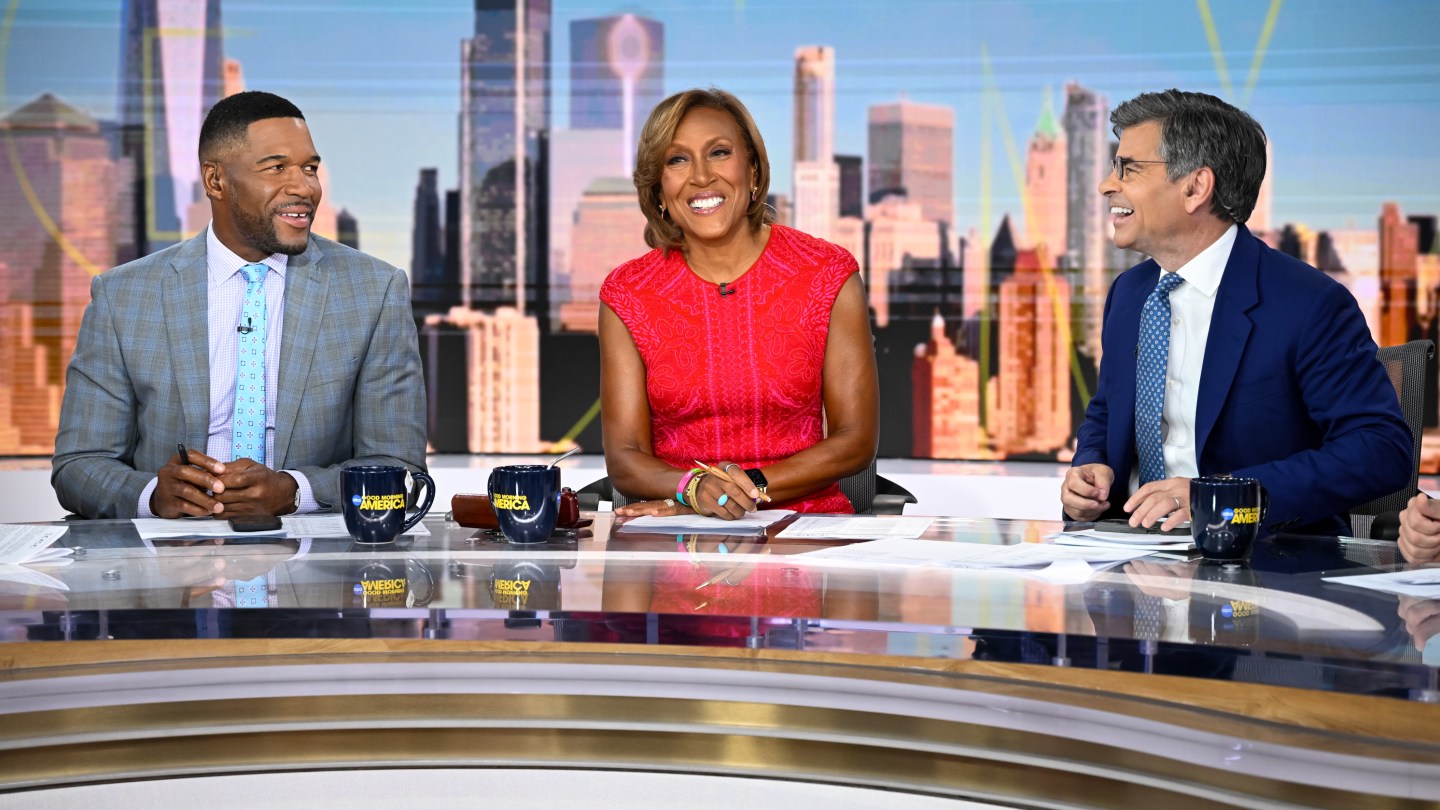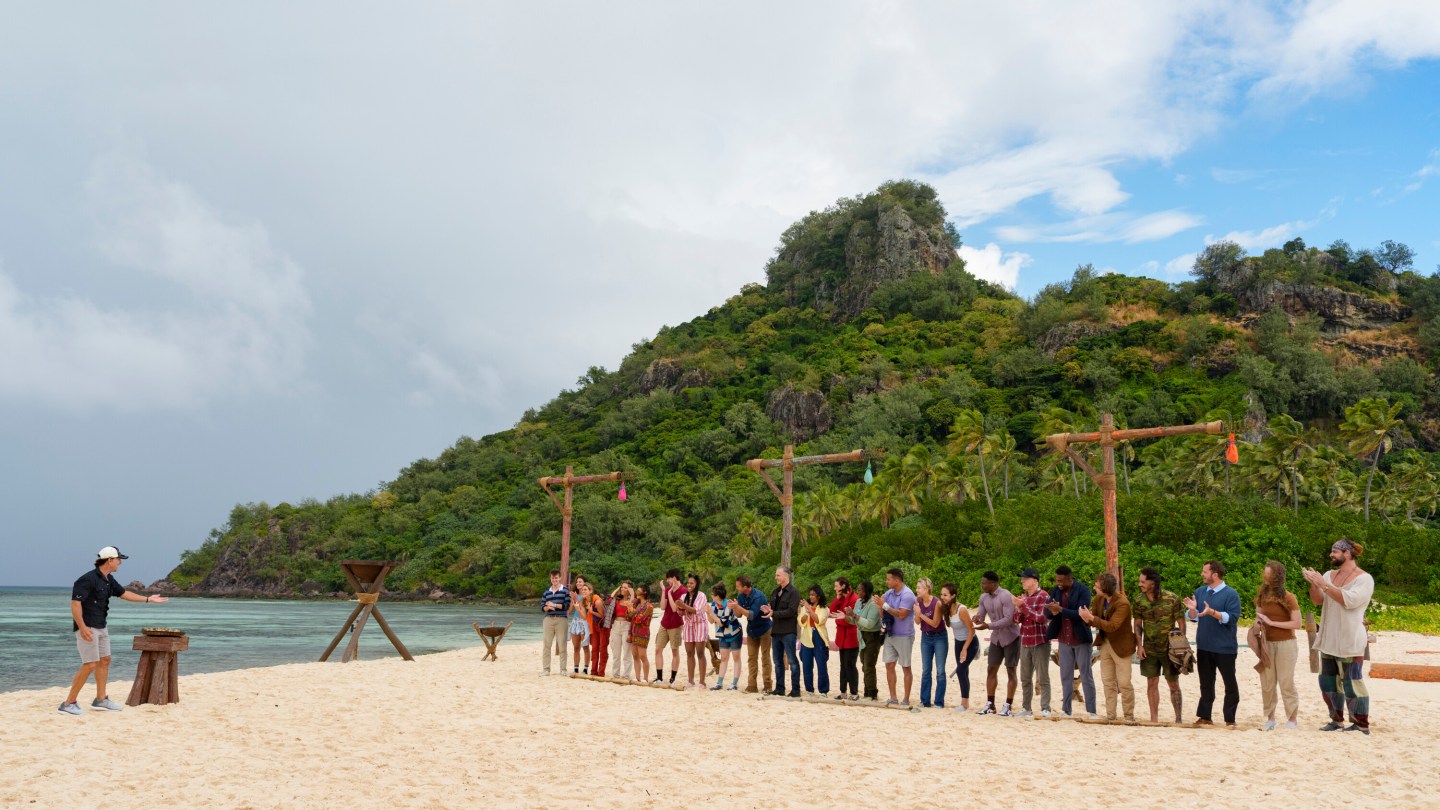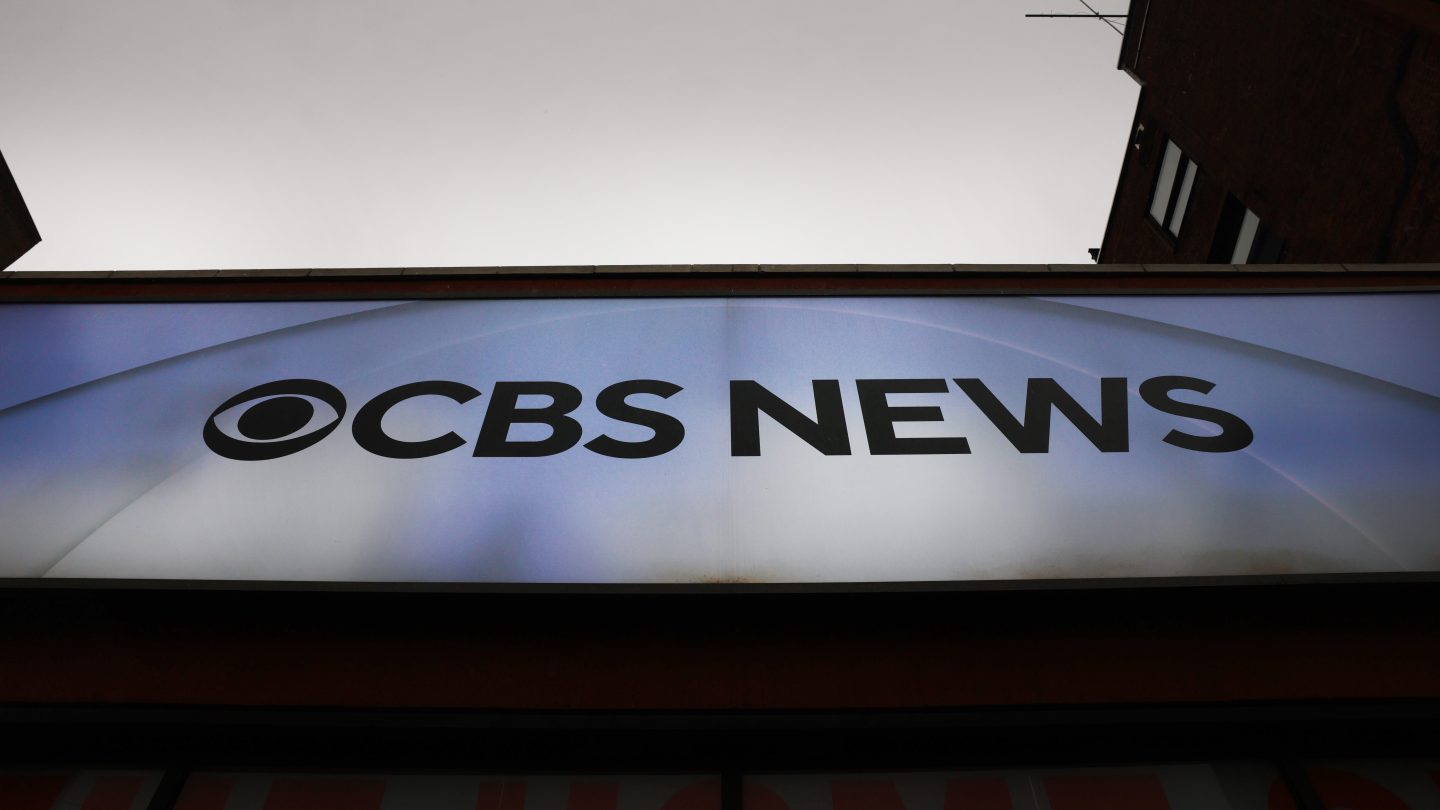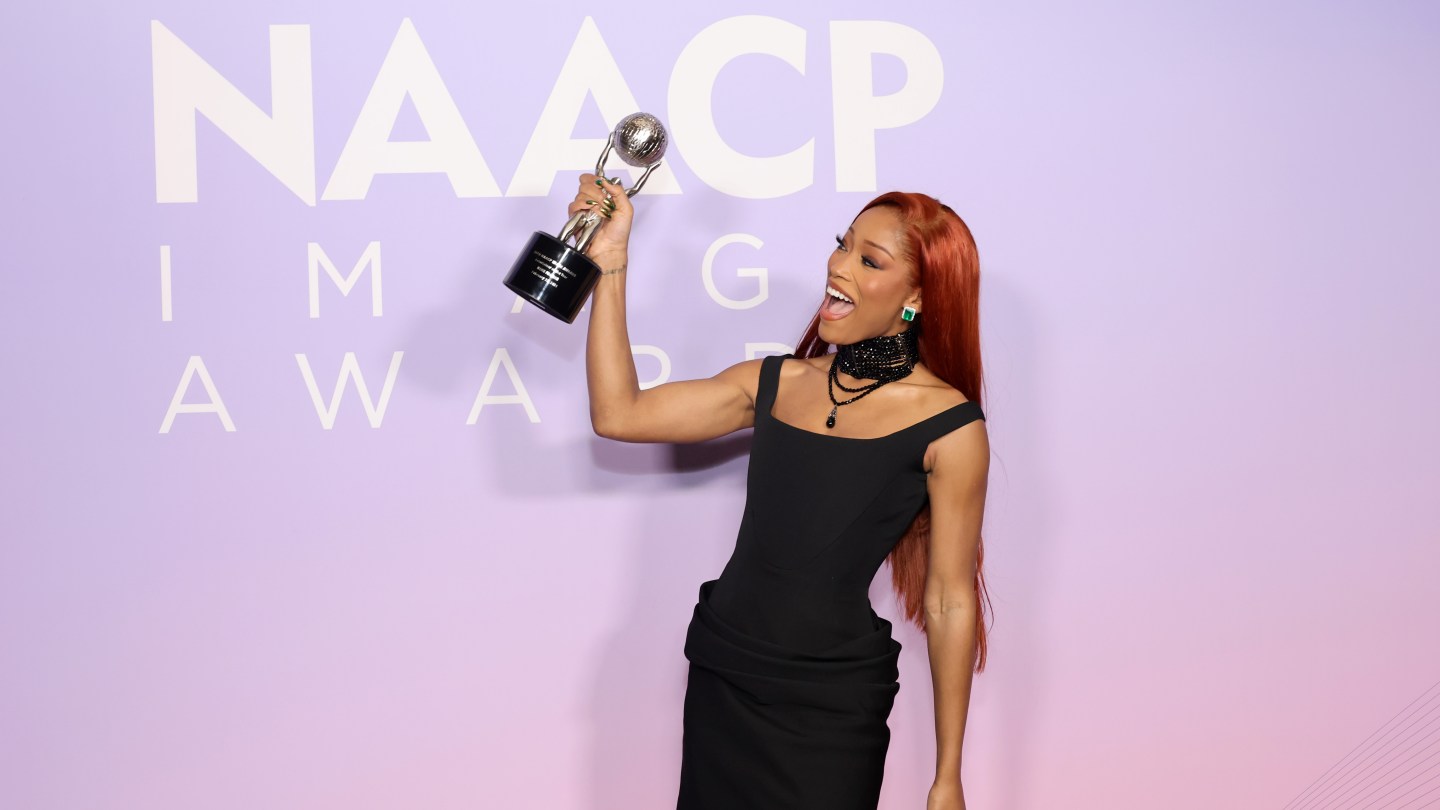On Monday, Good Morning America will hit a rare TV milestone: 50 years on the air. To celebrate, ABC News is bringing out an all-star cast: Many of the show’s former anchors, Diane Sawyer, David Hartman, Charlie Gibson, Joan Lunden, Kevin Newman, Lisa McRee and Nancy Dussault, who will toast the occasion with the trio now holding down the anchor desk: Robin Roberts, George Stephanopoulos and Michael Strahan.
Roberts and Stephanopoulos are now the longest-running anchor duo in morning TV, having first been paired up in 2009. Strahan joined them in 2016. The result has been a hit, with GMA now holding down 14 straight years as the most-watched morning show in total viewers, a testament to the anchors leading the program and their longtime staff.
But it almost didn’t happen. “I think I turned it down three times because I just didn’t think I was the right fit for it,” recalls Stephanopoulos, sitting in a green room in Disney’s newly-opened New York headquarters building, a few minutes after that day’s show had wrapped. “I only got to turn it down twice,” quips Strahan.
The trio of anchors share a remarkable chemistry, the secret ingredient to any morning show, where keeping viewers engaged means pulling them in through sheer force of personality (that chemistry was amplified in an episode of Hot Ones Versus last week, with the anchors playing party games while downing increasingly spicy chicken wings).
In the case of GMA, the person wrangling the trio (not to mention all the other on-air contributors and dozens of crew members) is Simone Swink, senior executive producer of the franchise.
A tour of the new subterranean studio reveals a set that finally lives up to the show’s status on TV. Rather than being jammed into a studio in Times Square, the anchors now deliver the news, talk “Deals & Steals” and interview celebrity guests from a massive space with LEDs on nearly every wall, and the entire floor, which can be customized to every occasion.
In a rare joint interview with The Hollywood Reporter, Strahan, Roberts and Stephanopoulos reflect on 50 years of GMA, their record-breaking run as co-anchors, why all three of them had their doubts before joining, and why Good Morning America is “the best name ever for a program.”
What struck me while I was watching that [the Hot Ones Versus episode] was that you actually play off each other in a natural, organic way. As someone who follows the television business closely, you can’t fake chemistry. You can’t fake the interaction.
George Stephanopoulos: Not every day for two hours!
You can fake it for two minutes, yeah, but that’s about it. When did you realize that, “you know what? I think this is working, and I think we actually play off each other in a really interesting, engaging way?”
Stephanopoulos: It happened pretty quick for me. I mean, it’s a phrase that’s not in vogue right now, but our strength is our diversity. We’re very different people, but we would complement each other, and we respect each other. And I think that shows every morning.
Michael Strahan: I think that’s the biggest thing. When I first got here, I was a little nervous, I will not lie to you, I was intimidated, because you walk into a show that’s successful with two people that you admire from afar, and then you’re part of it. And I gotta say, we’re so different, but I think we all have very similar values and respect and all those different things. It just works. It’s just natural to the point where it’s fun.
Stephanopoulos: And because we’re different, we can be ourselves on camera, because not everybody has to do exactly the same thing in every show.
What I find interesting is a morning show is a very specific type of show, and you have to almost talk through the camera to the audience, and you have a more personal relationship, frankly, than a lot of other television programs where — whether it’s a hard interview, or whether it’s a reported segment — and you each of you kind of came from a different part of the media ecosystem. Why did you even want to work in the mornings?
Stephanopoulos: I mean, I didn’t.
Strahan: I didn’t either George. I told them no. When they asked me, I said “nah I’m good.”
Stephanopoulos: I think I turned it down three times because I just didn’t think I was the right fit for it. But they said, “no, we see something. We know what we’re trying to build here.” And, you know, I’m so glad they convinced me, because it’s just a fun and fulfilling show to do, because you cover so much of life every morning.
Strahan: I only got to turn it down twice.
Stephanopoulos: This show is so important to ABC, you learn that really, you can say no, but…
Strahan: I agree with George, what I love about it. Because my whole thing was, I don’t want to wake up that early. That was the first thought I had, but we cover so many different things every day, and it changes so much that it makes the show interesting. And I think that’s the greatest gift of being on GMA, is that every day is different, every day is interesting. Every day we have correspondents and people in different areas, and you’re learning something. We’re not a static show where it’s the same thing every day like Groundhog Day. And I think that just keeps my interest going.
George Stephanopoulos: I’ve done a lot of different things at the network, but the biggest skill — to get to the point that you are making about the intimacy — is just to be there and to be fully present as a human being, because you’re getting so many different kinds of stories bringing up so many different kinds of emotions, that you have to just really be there with the audience as they’re going through it.
Strahan: And I realized how diverse it was when I’m out and about people are talking about different things, and my friends and other strangers, and you’re going, “oh yeah, I know about that, we talked about that today.” In my head, I’m going, man, I actually know a lot more than I thought I knew.
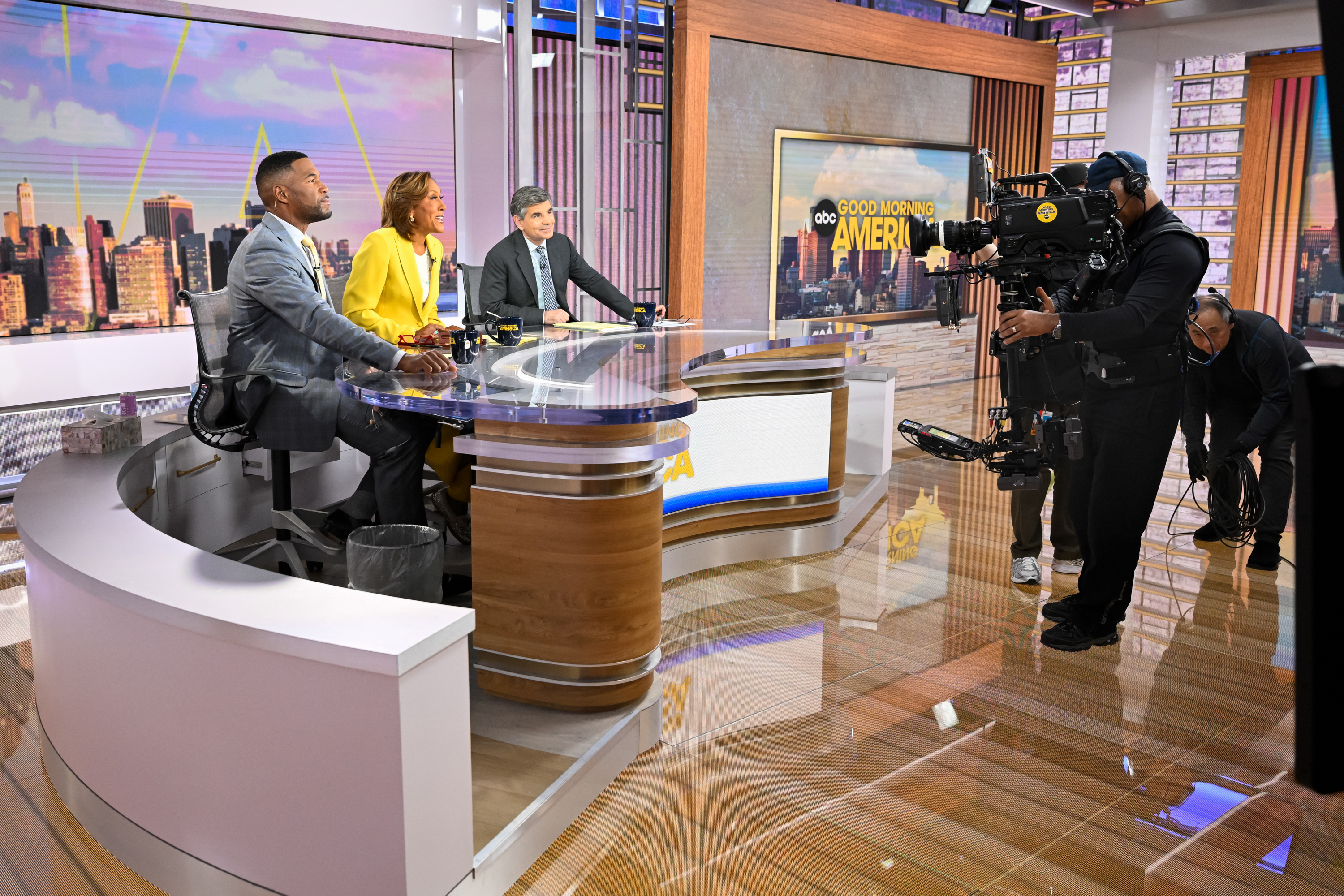
That’s one of the things that I think is so unique about it is you can have tough breaking news, serious news at the start of the show, and by the end of the show you can do softer segments. You can do deals and steals, the more shopping or culture focused segments. It’s a complicated balance to be able to grill a U.S. senator and an hour later talk about a consumer packaged good.
Stephanopoulos: How about a few seconds later? You just try to take a breath, you want to make sure they don’t have emotional whiplash.
Strahan: It’s a show for everybody, so you have to be able to do all those things. And it is interesting to have something very serious and having to make a turn to something that is not so serious. But, yeah, it’s a very it’s a unique show that should be for everybody. You should be able to watch it and get that hard news, but you also should be able to watch it if you want someone who likes something on the lighter side. Maybe the “Play of the Day” is a part of the day that you like, maybe you love Tory Johnson coming on with Deals & Steals, but you should be able to get everything you need all within one show. And that’s what we do every day.
Let’s talk about the 50th anniversary. Not many shows are able to hit that milestone on television. I think you could probably count the number of shows on your two hands, and maybe one foot for extra measure. It actually says a lot to have a show that lasts that long. And it also speaks to how the show, and I guess the three of you as anchors, are willing to adapt and change to go along with it. I’m curious, from your perspectives, what has been the biggest change since each of you started on GMA?
Robin Roberts: It’s not your grandma’s Good Morning America. I mean, it’s changed. America’s not the same as it was 50 years ago. And I think we’ve adapted to the the needs and wants of our audience, and we talk about those things that have changed, the one thing that hasn’t changed is the audience, our focus on them. I think all the years that we’ve had this program, we always focus on, okay, who’s watching us,? What is it that they need? What is it that they want? And those needs and wants have changed over the decades, but I just got caught up when you just said, there’s not many programs that have been around that long.
I remember, I think it was Charlie [former GMA anchor Charlie Gibson] who said it is the best name ever for a program, Good Morning America. I mean, think about it, it’s like and we know it’s a responsibility and a privilege to say good morning to America and try to set the tone for the day. And that’s something that has carried through all these decades.
Stephanopoulos: On the news side, the competition has changed so much. When I first came on GMA, working here, in 1997, Fox was only a year old. It’s well before the internet and social media was really monopolizing news coverage in so many ways. Before we had the monopoly, now we’re competing with so many different voices and so many different voices that are, frankly, peddling fake news. And it’s up to us to be as clear as we can.
Roberts: And the way they’re consuming us now is different, it used to be like, okay, 7 am you’re at home getting the kids ready. Now with this, you can watch us anytime. It’s on your demand, not so much us. And I think that has changed a great deal as where people watch us and how they watch Good Morning America.
George, when you look at the environment we’re in right now, consumers don’t necessarily trust the media in the way that they once did, but you also have very personal relationship with your viewers, and I think that it’s a unique situation where you have this very personal relationship with viewers at the same time that a lot of consumers are maybe turned off by the news or don’t trust the news. So from your point of view, how do you try to maintain that relationship that you have with viewers who wake up every morning and trust you and watch Good Morning America, and also try to build trust with an audience that I think has kind of moved away towards social media and these other platforms where a lot of it is just kind of garbage?
Stephanopoulos: It’s tricky. I mean, I can only speak for myself. I guess my answer to it is, it goes back to what you’re saying about whether you can fool people, is just to be as honest as you can across the board, don’t pretend you’re someone you’re not. Clearly try to deliver the news in as accurate a way as you can, and then trust that people will do the right thing with it.
Strahan: Yeah, think that’s the one of the toughest parts now, is that a lot of the truth is discredited, because if someone doesn’t agree with it, they’re just gonna dismiss it. “It’s fake, it’s fake.” Forget about hurting the news business, I think that’s just hurt people period. So for us, we show up every day, we give you the honest truth of what we know it to be, and we have to just depend on the audience to trust it or not, but I just think that we show up every day with the best intentions, and I think that that comes across on camera. I think our honesty, I think our openness, all those things come across to the audience, and it’s been 50 years, so I guess enough people are still believing us.
Roberts: I would say same thing that these gentlemen have said, and I think what’s also helped is the consistency that we’ve had and the longevity we’ve had as a team. And I’ve heard people time and time again when things are just going wacky or whatnot in the world, that they look to us because they know that they’re going to get the truth from us. And I’m gonna say it: We’re very proud of our profession, and we understand exactly what you’re saying, that there is mistrust, and so you have to build that trust. And the way we do it is being consistent, is being authentic, not sugarcoating things.
Sometimes you have no control over how people are going to receive the accurate information that you’re giving them, they’re going to use it or not use it, but we have no control over that. But we do have control over checking our facts, knowing our intentions are right and pure, knowing we have no agenda other than to give people the unfiltered truth period.
Stephanopoulos: One of the blessings of live TV is that you can’t be perfect. We all make mistakes every single day. And the thing with GMA, because it’s live, is people see it when you make a mistake and when you’re upfront about it and laughing about it or moving on. I think that actually helps build trust too.

Yeah, transparency and just being upfront. You have a live show every morning, but also one of the big changes that you mentioned, is that the way people are accessing it is not the same. For a lot of people, it’s possible that the only way that they’re watching Good Morning America is on Instagram or YouTube or some of these other places. You have the show, but also what you do is kind of being dispersed in 1,000 different places, chopped up 1,000 different ways.
Roberts: But the storytelling is still the same, and we still approach it the same way, even though it’s being received differently by different people on different platforms. I don’t think it’s really changed how we approach a story, or how we cover a story, or what we put on the program.
Stephanopoulos: But it really extends our reach.
Roberts: Oh yeah, we love it.
Strahan: I think we all show up and we do our job, and if they want to put it on Disney, Disney+, Hulu, Hulu+ whatever other one they’ve got with a plus, that’s up to them. We give you the content, and you just make sure we get it, as George said, to the biggest platform, the largest amount of people.
Stephanopoulos: It can be really surprising what ends up playing out on Instagram. I think I did a segment last December where McDonald’s was announcing some kind snack thing.
Strahan: The Snack Wrap.
Stephanopoulos: Yeah, millions and millions people watched it, and I didn’t even think about it when it was going on.
As you look ahead, and as you think about what’s happened at Good Morning America during your tenure as a trio, and you look ahead to what is possible, you know, and the continued evolution, how do you want or expect the show to evolve or change?
Roberts: I look at uncertainty, meaning that there are endless possibilities. The possibilities are endless. GMA has been on the cutting edge. We were the first ones to go with a three anchor format. No one else had done that until, until we did that.
Strahan: You two regretting it yet?
Roberts: I remember when [former ABC News president] David Westin walked in my cubicle, my cubicle! And said, you’re going to be anchoring with Charlie [Gibson] and Diane [Sawyer]. And I was like, well, which one’s leaving? And he was like, no, you’re going to be doing it with them. And I’m like, that’s not how it’s done. So I foresee that we’ll continue to do that going forward.
From your point of view, why do you think that the three of you as a trio have worked? What kind of makes it tick?
Roberts: Trust. I trust these two guys. They’re never going to try and make me look bad. It hasn’t always been that way with people, not so much in this program, but in my career. But when you have the trust of the person that’s sitting on either side of you, that’s a huge safety net, and if you mess up, they’re going to be there to clean up your mess and not make you feel bad about it. And respect we could not be three more different people.
Strahan: We’re not competing with each other for anything, and we’re happy when someone has success. We’re happy when families have success. We don’t compete in any way against anything.
Stephanopoulos: Except for hot wings.
Roberts: Oh because he won.
Strahan: George cracked on me yesterday, and I’m literally walking to the bathroom in the break, and I’m laughing to myself, I see both of them, but I’m still laughing about it, because it’s so much trust and love there. I love that banter. That’s something to look forward to every day. As I said, it’s not Groundhog Day, and not just in the content of the show, but it’s not Groundhog Day in the relationships when we sit at the desk.
Roberts: No two days are ever the same.
Stephanopoulos: If one of us is more tired one morning, you know that someone else is gonna pick up
Roberts: I was coming out of the audio booth this morning, because I was kind of in an “eww” mood, yesterday, and you said something like, “nope, not two days in a row, Tuesday is my day, I claim Tuesday, armpit of the week.”
What are the first things that you think of when you think of Good Morning America? And what do you hope stands the test of time as it relates to the show?
Stephanopoulos: What Charlie said, it’s just the best titled show, to be able to say that every morning as a wish for everyone is a great thing.
Roberts: I think family. People throw around the phrase work family, but not just that. I think about the time that we’ve all had family members come to the show, and it’s like, really cool, and it makes us realize, oh my gosh, what we’re doing is really something special when we look through the eyes of our our family members. My mother and father are both deceased, but I remember they were part of a Cosby Show skit that we did. And I still have pictures of that, and I treasure that.
And there’s our crew. I know people say this all the time, but they are the best in the business. They’re the reason why we can be so comfortable out there. They’re the reason why we can do what we do, and many of them have been here longer than we have been.
When I think about GMA, I think about family. I think about our family, and I think about families that are watching us, and families who have watched us for generations. You’ll get people that will come in and they’re they’re adults, and they said, I’ve been watching GMA since I was a kid, because my mom had it on, and now they’re watching it with their kids.
Stephanopoulos: It’s when adults come in and say “my mom loves you” that it gets awkward.
Strahan: I was in Boston yesterday and all these kids were saying “my mom loves you, my grandmother, my mom…” It’s funny. I’m just looking at the affiliates who they just had a behind the scenes video, and the affiliates who were here, and I’m watching him Go Pro the whole studio. And it makes you realize, when you come somewhere every day, I’m looking at it going, this is really a big deal to a lot of people who aren’t here every day.
I think you have to come here every day with a new amazement, a childlike curiosity and a childlike energy, because for me, I just want it to be fresh every day. It’s always been fresh to me every day for all the years that I’ve been here. But when I think about GMA, I think about as George said earlier, he and I both said, “nah, we’re good. We don’t want to do it.”
Roberts: I remember we [Robin and George] were going out for a drink, and you barely sat down, and were like, “I don’t want this job.”
Strahan: He was like “did I finish a sip of my cocktail?” But when I think back on it personally, I think what an unrealized opportunity I had at that time, it would turn into one of the best experiences of my entire life.
Roberts: When I started, I kept my job at ESPN.
Strahan: Just in case?
Roberts: Just in case. But now look at us all these years later.
Strahan: Family and lifetime bonds.
This interview has been edited for length and clarity.

